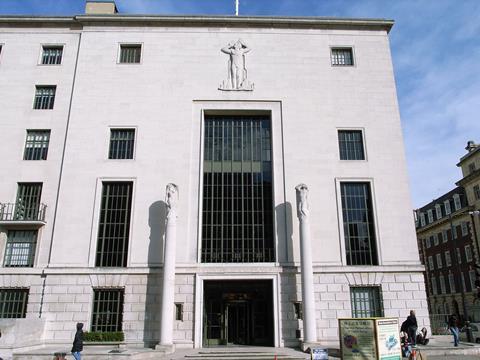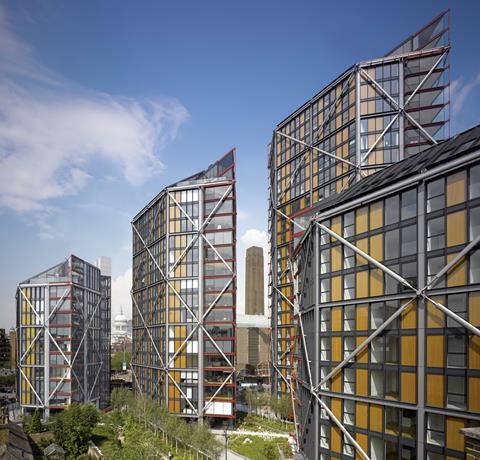Campaigners object to shortlisting of Rogers Stirk Harbour & Partnersā luxury Neo Bankside flats

The campaign group Architects for Social Housing is planning to picket this monthās Stirling Prize in protest at the shortlisting of Neo Bankside, the luxury flats designed by Rogers Stirk Harbour & Partners.
It claims the 217 flats are aimed at rich non-resident buyers with price tags far out of the reach of ordinary Southwark residents. It also objects to the way the number of āaffordableā flats was negotiated and to the fact they were built off-site.
āThis is a very high-profile award, with lots of press attending, so itās a good chance for us to tell the truth about Londonās housing crisis through focusing on an individual building,ā organiser Simon Elmer on Facebook.
He said he would be ābellowing through a megaphoneā a litany of reasons the flats should never have been built, let alone nominated for a prize for making āthe greatest contribution to the evolution of architecture in the past yearā.

The list of objections includes developer Native Landās viability assessments which he said reduced the proportion of āaffordableā homes to less than borough policies specify.
āWe protest against the nomination of Neo Bankside for building multi-million-pound luxury apartments and penthouses for nom-domiciled tax exiles and foreign investors that will still be empty when 88,000 London children are homeless this winter,ā said Elmer.
He helps lead Architects for Social Housing (ASH) which was set up by architect Geraldine Dening earlier this year, partly in response to plans to demolish homes on George Finchās Cotton Gardens estate in Lambeth.
The group is also planning a protest at Mipim London on October 21 and is looking for an architect to design a temporary pavilion which can be erected outside Olympia to house a street kitchen for the homeless.
āWe call on all architects to begin working with Londonās communities to help meet their housing needs, rather than accepting their current function as funeral directors of the working class,ā said Elmer.
He accused RSHP and the RIBA of āviolatingā paragraph 5 of ARBās code of conduct: āTo consider the wider impact of your workā.
And he argued that architectural award ceremonies like the Stirling Prize give ācultural legitimacy to the class war being waged through housing in Britain todayā.
āWe protest against the nomination of Neo Bankside for spending Ā£400 million on 217 luxury apartments when, based on the Ā£177,000 for each of the 13 flats by NĆall McLaughlin Architects, they could have built 2,260 Peabody flats,ā he added, referring to the housing association flats in Whitechapel which are also on this yearās Stirling Prize shortlist.
Elmer appealed for sympathisers to join the protest outside the RIBAās headquarters on Portland Place from 5pm so they can address as many guests as possible (ātheyāll all be slurping champagne inside by 6pmā).
What is ASH?
Architects for Social Housing (ASH) describes itself as a collective of architects, urban designers, engineers, planners, academics, theatre directors, photographers, writers and housing activists.
It believes that infill, build-over and refurbishment are more sustainable solutions to Londonās housing needs than the demolition of council estates, partly because this allows communities to remain intact.
āASH offers support, advice and expertise to residents who feel their interests are not being represented by local councils or housing associations during the regeneration process.
āASHās primary responsibility is to existing residents ā tenants and leaseholders alike; but it is also committed to finding viable alternatives to developer-led regeneration ā alternatives that are in the interests of the wider London community.ā
Its 348 Facebook members include FAT co-founder Sam Jacob, Finn Williams of Common Office and the filmmaker Andrea Luka Zimmerman.
Source
This story first appeared on ŠŌ°ÉµēĢØ Design























No comments yet